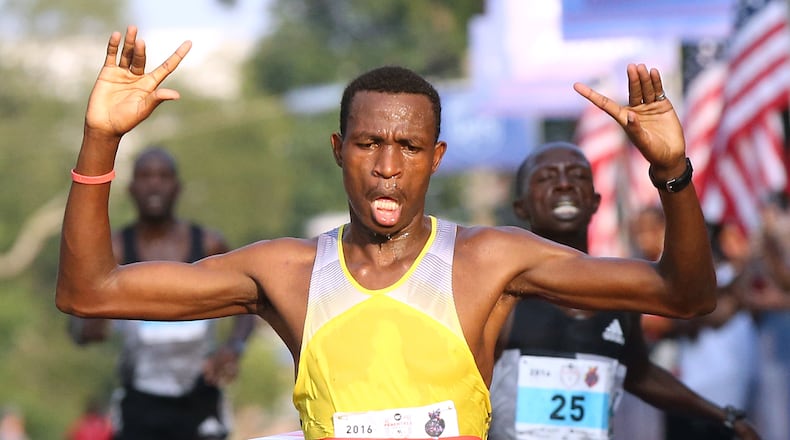Until Monday, Gabriel Geay’s first trip to the United States had not been one to celebrate. He had come to the U.S. from his native Tanzania in June to try for a qualifying time for the Olympics and came up agonizingly short. After deciding to stay to run road races to make some money, he was blown out in his first attempt.
Debts were mounting. The field of The Atlanta Journal-Constitution Peachtree Road Race was tough. And then Geay, 19, pushed ahead of a three-man pack to claim victory. He finished the 10K course in 28 minutes, 48.50 seconds, .15 seconds ahead of Kenyan Daniel Salel. Kenyan Philip Langat chased them home in 28:51.40. Both men finished more than a minute ahead of him in a 10K race a week ago in Boston.
Halfway through the race, “I feel very good and then I pray at that time,” Geay said. “God blessed me to win this race.”
Geay’s time was relatively slow by Peachtree standards — the course record is 27:04 — but was nonetheless at the edges of human performance. To put it in a distance more familiar with Americans, Geay essentially covered 100 yards in 15.8 seconds 109 times in a row, often running uphill and always in high humidity.
In early June, Geay came to the U.S. to try for an Olympic qualifying time for the 10,000 meters at a meet in Portland, Ore., the trip sponsored by a manager who had Geay recommended to him by a coaching friend.
He needed to run 28:00, and he finished in 28:04.98. On spent legs, Geay ran the 5,000 the following day in 13:25.66 — the qualifying time was 13:25.00.
Derek Froude, Geay’s manager, said he was philosophical about the setback and made the decision to stay to run some more races, the first of which was the 10K in Boston, where he finished a distant 10th.
“Very discouraged at this point,” Froude said. “He’s spent a lot of money, a long time away from home and not actually achieved anything.”
Froude said he told Geay to rest — he had come to Boston after high-altitude training — and something clicked. His Peachtree time was 33 seconds faster than his time at Boston, a flat course typically run in ideal conditions. Salel and Langat ran 40 and 49 seconds slower, respectively.
“I didn’t think I would win (Monday) because there were very strong people,” he said.
Geay earned $7,500, which clears his travel costs and gives him money to take home. According to data on the United Nations website, the average annual per-capita income in Tanzania in 2013 was $928.
He is thought to be the youngest men’s winner in Peachtree history. Froude said it’s not unusual for Kenyan and Ethiopians to win races such as the Peachtree at that age, “but it also tends to be a marker for future success.”
A most memorable Independence Day for a 19-year-old from the foothills of Mount Kilimanjaro.
“I’m very happy,” he said.
About the Author
Keep Reading
The Latest
Featured




